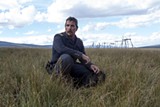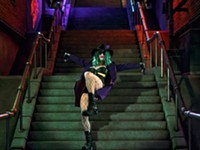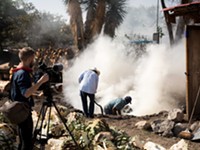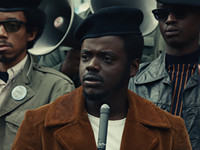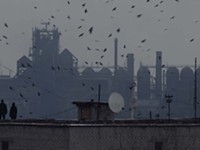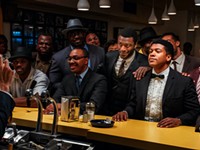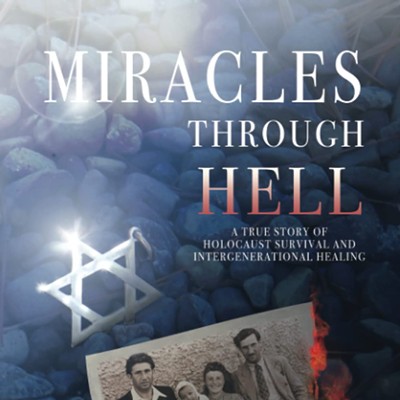[
{
"name": "500x250 Ad",
"insertPoint": "5",
"component": "15667920",
"parentWrapperClass": "",
"requiredCountToDisplay": "1"
}
]
Writer-director Scott Cooper ("Crazy Heart," "Black Mass") tells the brutal story of the American West with his harsh, bloody, and uncompromising "Hostiles." The film begins with horrific scene, as a Comanche raiding party descends on the New Mexican homestead of a family of white settlers. In short order, the family is picked off: the father scalped, three children -- one of whom is just an infant -- shot dead, and their mother only barely managing to escape by scrambling into the nearby woods.
By opening with the most horrific of its many horrific moments, the movie provides its audience with a litmus test: if you can make it through the gruesome prologue, you'll have some idea whether you can stomach whatever else Cooper has in store. However, the filmmaker fails to mount a convincing justification for why we should bother suffering through the self-consciously dour two hours that follow.
"Hostiles" is another in the long line of revisionist westerns, descended from classic films like 1956's "The Searchers" -- movies that have attempted to flip the script on what the genre has traditionally told audiences about the nature of good guys and bad guys on the wild frontier.
Christian Bale plays Captain Joseph Blocker, a cavalry officer who reluctantly accepts a mission to shepherd the aging Cheyenne chief, Yellow Hawk (Wes Studi) and his family (Adam Beach and Q'orianka Kilcher) back to their people's sacred tribal land in Montana. A bitter, angry man, Blocker nurses an unyielding hatred of the Native American people, justified -- he believes -- by the horrors he witnessed the "savages" commit while in battle. As a soldier, we're told he's "taken more scalps than Sitting Bull," and Blocker is unremorseful, seemingly more than ready to give Yellow Hawk the same treatment.
The rest of Blocker's party is filled with recognizable faces, including Jesse Plemons, Timothée Chalamet, Rory Cochrane, and Jonathan Majors. Unfortunately, the actors don't have characters to play so much as roughly sketched types, and as a result they mostly end up delivering variations on the same gruff, mumbly-mouthed performance.
Along the way the group encounters Rosalie (Rosamund Pike), the woman left widowed in the film's harrowing opening sequence, and after the soldiers help lay her family to rest, she joins their party. Pike is an immensely talented actress, but here Cooper's direction fails her completely, allowing her to deliver a sometimes cringingly overwrought performance as a woman completely consumed by grief. The fact that she continues to carry around the lifeless body of her baby is, well, it's a lot.
But as the Comanche raiders continue to track them, the two sides are forced to put aside their differences if they have any hope of fending off the enemy, and fine some begrudging commonality in their fight for survival. The long trek allows plenty of opportunity for Blocker to confront his prejudice, amidst the men's many heavy-handed conversations about what it means to take a life and the toll it ultimately takes on one's soul.
"Hostiles" is beautiful to look at, filled with those classic John Ford-style vistas, gorgeously photographed by cinematographer Masanobu Takayanagi. The scenery is undeniably breathtaking, as the country's natural beauty contrasts with the savagery on display.
The result is well-intentioned, but hollow. Life on the frontier was terrible, and telling us so is hardly anything new. In telling this stark, bloody tale, "Hostiles" attempts to grapple with the endemic violence that American history is built upon. But Cooper does a great disservice to these aims by flattening out the Native American characters, never bothering to develop them beyond stoic, noble stereotypes.
Without allowing us to learn the motivations that drive their actions, the narrative becomes frustratingly one-sided. It's telling that the slaughter of Rosalie's family is immediately followed by a scene in which Blocker brutalizes an Apache family. It's clearly meant to underline the similarities between their situations, but by showing the second scene entirely from Blocker's point-of-view, the intended effect is lost completely.
Stripped of any interiority, Native American characters are treated simply as plot devices to enlighten the white characters and offer a path toward some sort of redemption. The film offers a somber meditation on the possibility of reconciliation, but stumbles along the way by sacrificing the story's necessary complexity and mistaking a relentlessly grim tone with saying anything of substance.
